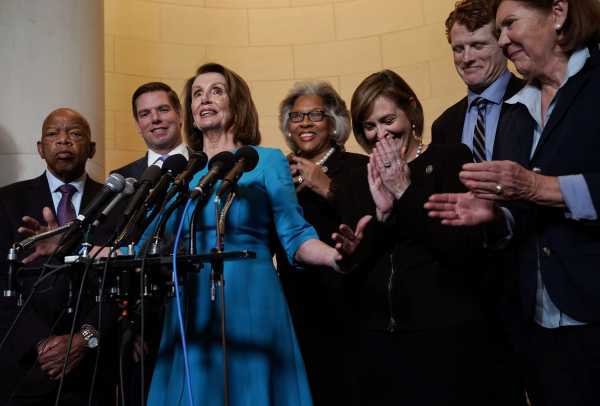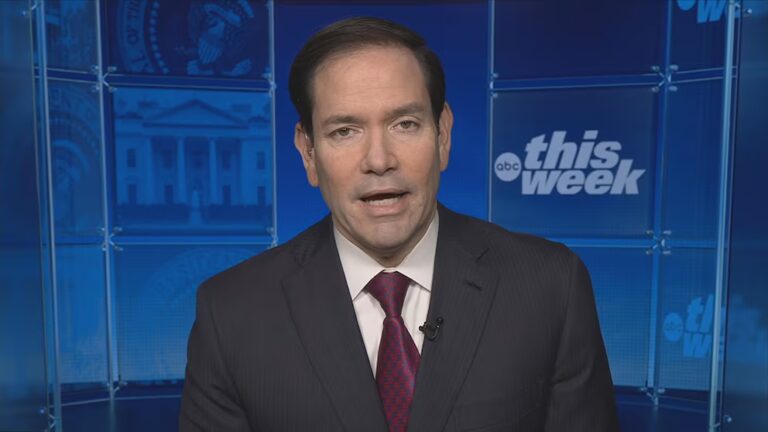
Nancy Pelosi won her nomination for House speaker easily on Wednesday, getting the vast majority of House Democrats to vote for her.
Thirty-two Democrats voted against nominating Pelosi for speaker by secret ballot, even though she was running unopposed. Pelosi’s next big vote is in front of the entire House on January 3, and she needs to flip at least 18 of her dissenters to win.
After sweeping the House in a wave election, Democrats are trying to unite against President Donald Trump and behind Pelosi. But Pelosi’s decades of leadership experience — the foundation behind the pitch she is making to members as to why she should remain in the top spot — is spurring a small rebellion.
Pelosi and the No. 2 and No. 3 House Democrats Steny Hoyer and Jim Clyburn all ran unopposed on Wednesday. Pelosi was cutting deals up to the last minute before the vote to gather as much support as possible behind her, but not everyone was on board. Though the 32 no votes are far fewer than the 63 Democrats who voted against her for minority leader just two years ago, it’s a signal that a number of House Democrats want Pelosi and her longtime deputies to step aside.
Directly before the speaker’s vote, Pelosi met with three of her most vocal Democratic opponents: Reps. Seth Moulton (MA), Kathleen Rice (NY), and Tim Ryan (OH). Moulton and Rice in particular pressed Pelosi on whether she would provide a clear transition plan ahead of 2020, opening up the path for a new leader to emerge.
“People need to know when this leadership team plans on turning the reins over to the next generation of leaders,” Rice told reporters.
But Rice characterized Pelosi as unwilling to listen.
“Unfortunately, our concerns were dismissed outright,” she said in a statement.
Nevertheless, the Pelosi era, which began more than a decade ago, is extremely likely to continue when Congress reconvenes in January.
The Democratic leader sounded as confident as ever when she stepped to the microphone and declared victory at a press conference — even as the votes were still being counted.
“I think we’re in pretty good shape,” Pelosi said.
Not all young members want someone new
Pelosi faces some of her strongest criticism from freshmen and other young members, so it was significant that the Democratic leader was nominated by Rep. Joe Kennedy (MA), a young Congress member who argued Pelosi had the experience to build consensus in the party and fight back against Trump.
The symbolism of Kennedy, who is from the same state as “Never Nancy” movement leader Seth Moulton, wasn’t lost on people.
Other young members agreed with Kennedy, laying out reasons why they backed Pelosi.
“She is a brilliant leader, someone who has the experience, the tenacity and determination to lead us in a direction that’s going to produce prosperity for all Americans,” said Rep.-elect Ilhan Omar (MN). “I think at a time where we are at a dangerous crossroads at our country it’s going to be necessary to have someone who has the experience to take on this administration and fight back and make sure we have the checks and balances that are needed.”
Rep. Eric Swalwell (CA), another Democrat who spoke on Pelosi’s behalf in the closed-door caucus meeting Tuesday, said he’s been actively encouraging other young Democrats to back Pelosi and existing leadership.
“The case to me is, we just won the Super Bowl of midterms,” Swalwell told Vox. “In the history of the Super Bowl, no coach has been fired after the Gatorade’s been dumped on him. Let’s keep the person that got us here, but also, she’s just the most effective person.”
There’s new blood in leadership — but not at the top
It was telling that the most competitive leadership races were for lower-ranking slots: Democratic Caucus chair, vice chair, and chair of the Democratic Congressional Committee. Some contested races were about the left versus the establishment, but they were also about representation of younger members, women, and people of color in the House.
The Caucus chair election was the day’s first and most contentious race, as Rep. Hakeem Jeffries (NY) beat Rep. Barbara Lee (CA). Lee and Jeffries are both members of the Congressional Black Caucus, but Lee later agreed that “ageism and sexism” were at play in her loss. (Lee is 72 years old; Jeffries is 48.)
“I absolutely think that’s the case,” she told reporters. “I’m a black woman and the institutional barriers are still there, so we just keep fighting.”
Members of the Congressional Progressive Caucus had backed Lee, a former Progressive Caucus chair. Rep. Pramila Jayapal (WA), one of the caucus’s current co-chairs, said she had hoped to make history as the first African-American woman chair of the Democratic caucus.
“I take some issue with generational change being just about age, I think it should be about ideas that resonate with young people across the country,” Jayapal said. “I hoped the results of this election — powered by black women, voters of color, and women — would have some resonance to this race.”
Jeffries and new Assistant Democratic Leader Ben Ray Lujan of Mexico, 46, are two young, diverse additions to the leadership team. But their additions aren’t enough to placate Democrats who hoped to see new blood at the very top of leadership.
Even though the Progressive Caucus was disappointed at the outcome of the caucus chair’s race, the group has thrown its full support behind the Pelosi, Hoyer, and Clyburn team. For now, Jayapal and others have resolved themselves to wait on generational change.
What’s next for Pelosi, and the movement opposing her
Pelosi now has a little over a month to whip the remaining votes she needs to become speaker. She needs to flip 18 of those votes — she can afford to lose 17 votes and still win.
Pelosi’s allies hope the secret ballot vote today can give members who oppose her the chance to vote no in secret to fulfill their promise to voters in their districts, and that they will turn around and vote yes in public on the floor on January.
But a few freshmen reiterated voting yes still wasn’t an option.
“I will not break my pledge when the vote comes to the floor,” Rep.-elect Max Rose (NY) said in a statement. “Staten Islanders and South Brooklynites have been lied to enough and that’s not who I am or ever will be.”
“Nothing’s changed,” Rep.-elect Jason Crow of Colorado, a Pelosi no vote, told Vox ahead of the caucus vote. Crow later released a statement that didn’t specify how he’d vote in January.
Pelosi’s opponents knew that she would be the nominee. They are now each focused on the January vote, but admitted there isn’t much of a targeted group strategy.
“Let members do what they want to do,” Rep. Kurt Schrader (OR) told reporters on Tuesday night. “We need to get organized as Democrats. We have one big issue we’re not in agreement on, but I think everyone wants to work together, so we’re not going to make a big play of it tomorrow. January 3rd, if we’ve got the votes. It’s January 3.”
It’s the date Pelosi is focused on, too. And she still doesn’t have an opponent.
Sourse: vox.com






